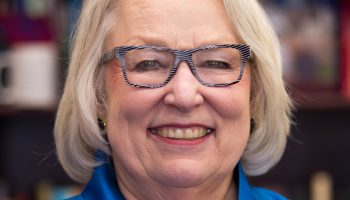
The inaugural Young Writers’ Institute took place during Weeks One and Three, giving students a platform to explore their love for words — even when school is not in session.
The Young Writers’ Institute looks to provide immersive instruction for 14-to 18-year-old writers interested in any and all genres, and equip students with the tools, experience and support necessary to carry their passion for writing into their adult lives and future careers.
“This is a serious thing; it’s immersive,” said Dave Griffith, vice president and Emily and Richard Smucker Chair for Education. “One of the outcomes is that they’re going to have a better sense of what it takes to really treat writing as a vocation, as something that they want to … devote themselves to and learn the craft of.”
The Alumni Association of the CLSC funds all-expenses paid scholarships available to rising seniors from Chautauqua County schools.
“It’s a vital part of the program,” Griffith said.
This year, the Alumni Association of the CLSC supported eight students from the Jamestown area to live with host families on the grounds and attend the Young Writers’ Institute. The organization also provided the students with gate passes, which Griffith said creates for an “immersive” educational and artistic experience.
Kenyatta Rogers and Kim Henderson led the five-day intensives during Weeks One and Three, respectively, providing mentorship and one-on-one instruction.
“Both of the faculty are not only highly skilled teachers, but they’re also published writers,” Griffith said. “Both of them teach in high school conservatory creative writing programs, which there are not many of in the country.”
Griffith said both instructors have a deep understanding of what skills teenage writers need and the questions they may have, which could range from career advice to developing an individual voice.
Rogers said teaching the camp was a learning experience, as the students had “little exposure” to poetry, nonfiction and fiction from their schools.
“They talked about the school structure and how everyone learns the same thing,” Rogers said. “I was shocked at how little their school curriculums has of the literary arts.”
Rogers said he taught “mostly new information they could take a stab at.”
“For me, it was good to expose them to a variety of disciplines and ways of thinking about writing,” he said.
Rogers teaches creative writing at Chicago High School for the Arts and is associate editor of RHINO Poetry. His work has been nominated for both the Pushcart and Best of the Net prizes.
Henderson said she was “energized” when teaching her students.
“I love how open young writers are to trying new things — they tend to approach literature without too many preconceived notions about what it should be or do,” she said.
Henderson’s writing has appeared in publications such as The Kenyon Review, Tin House Open Bar and The Texas Observer. She authored The Kind of Girl, and currently serves as the creative writing chair at Idyllwild Arts Academy.
Henderson said a particularly memorable moment was when two of her students read their poetry aloud as part of Stanzas on the Plaza.
“I think everyone enjoyed writing erasure poems, both by hand with markers and crayons and pages from old books, and at the Poetry Makerspace,” she said. “I think it makes a nice introduction to writing poetry because it highlights the exploration and discovery involved and is a good reminder that writing poetry should be fun.”
In addition to mentorship opportunities, students built relationships with one another. Each week of the Young Writers’ Institute took on a different personality depending on the students, instructor and weekly theme.
For example, during Week One, “The Life of the Written Word,” students attended Tyehimba Jess’ morning lecture in the Amphitheater. And during Week Three, “The Art of Play,” students had a pizza lunch with Chautauqua Literary and Scientific Circle author Victor LaValle while listening to Chautauqua Writers’ Center’s prose writer-in-residence Megan Stielstra deliver her Brown Bag lecture on writing with urgency.
“Being at Chautauqua Institution was one of the best teaching experiences I’ve had in a long time,” Rogers said. “Being in such a wonderful place, with such eager minds, doing a very intensive and rigorous week was refreshing for both my teaching practice, and I feel was the same for the students in their understanding of writing and craft.”




